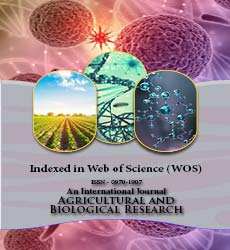Agricultural and Biological Research
RNI # 24/103/2012-R1
Charlotte Zoundji, Pascal Gbenou*, Ibouraïman Balogoun, Lucile Ghis and Bernadin Djossou
Vermiculture, an agroecological technique, provides a sustainable alternative to chemical inputs for soil fertilization. While the reproduction dynamics of Eisenia fetida, a key species for vermiculture, have been extensively studied in laboratory settings, gaps remain in our understanding of their behavior under real-world conditions. This study aimed to assess the reproductive performance of E. fetida in actual vermicomposting units at Sustainable Agriculture and Innovation Network (SAIN) farm, Southern Benin. Fifteen vermicomposting units, each containing 5 kg of fresh cattle manure and 30 g of E. fetida, were established with three substrate supplementation frequencies: monthly, bimonthly and quarterly. Physicochemical parameters of the substrate and biological parameters of the worms were monitored over a three-month period. Results indicate that the population and biomass of E. fetida doubled within a month, with a peak in reproduction observed after two months. However, significant substrate acidification was noted, potentially impacting substrate quality and worm growth. These findings suggest that initial density and substrate quality are critical factors for optimizing E. fetida reproduction. Future research should explore the effects of different initial densities and evaluate various organic materials to improve substrate quality. Such studies could contribute to the adoption of more sustainable agricultural practices, particularly in regions transitioning away from chemical inputs.
